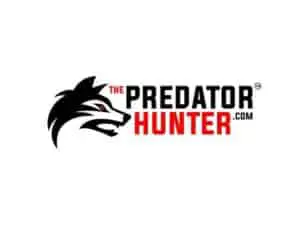If you plan to go coyote hunting in Texas, there are a few rules you should be aware of. While there is minimal public land in Texas, its use laws are very different from what you may do on private land. Make sure you regularly check for updates to state and local regulations.
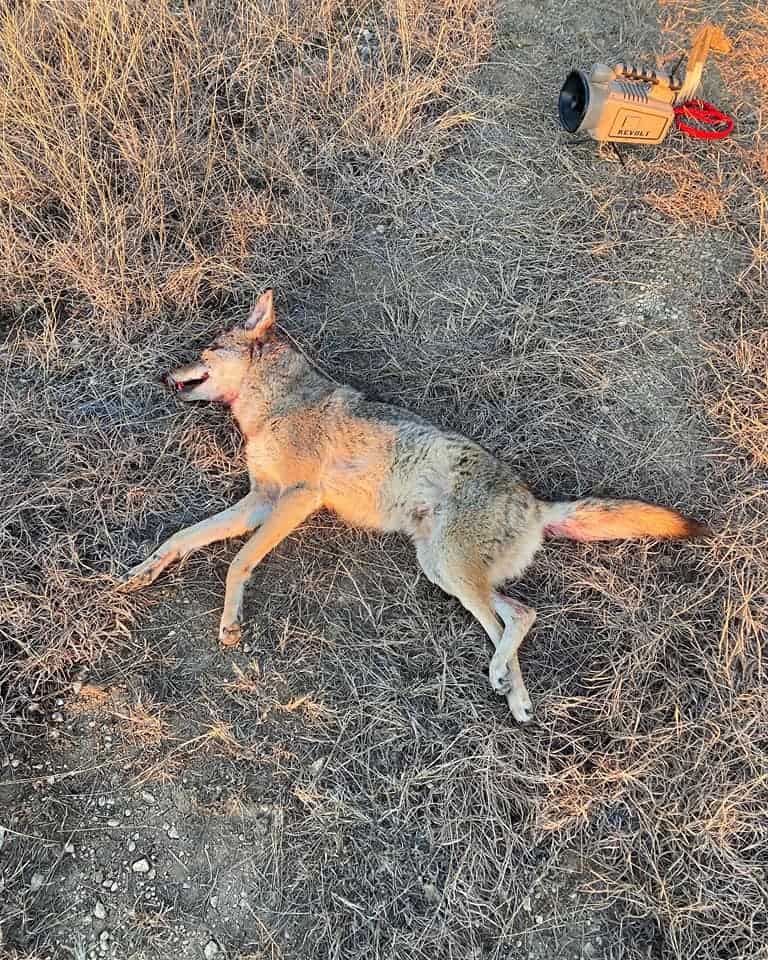
Coyotes are considered nongame mammals in Texas. Therefore, hunting coyotes is permitted all year. Hunting with the use of artificial light is allowed on private property. The use of electronic callers and decoys is also allowed. There are no bag limits.
Check out all of the Texas Hunting Seasons.
Related: Learn the rules for hunting fox in Texas.
Related: Learn the rules for hunting bobcat in Texas.
 Do you need a license to hunt coyotes in Texas?
Do you need a license to hunt coyotes in Texas?
A hunting license is required for the taking of nongame species. To purchase a hunting license online, click here.
No hunting license is required to hunt depredating coyotes on private property with landowner authorization.
Need to track a wounded coyote? Check out this article.
Is there a coyote hunting season in Texas?
Coyotes may be taken at any time of the year.
Is there a bag limit? No.
Are there any rules regarding possession? No.
Is night hunting coyotes in Texas permitted?
Yes, on private land with the permission of the owner.As a courtesy, please get in touch with your local game warden if hunting at night.
Check Price for ATN X-Sight 4K Pro IR Scope.
Are bounties and coyote calling contests allowed in Texas?
Coyote calling contests are allowed in Texas. Certain counties sometimes offer bounty rewards. Check your local county office for updated information.
Can you bait coyotes in Texas? Yes, on private land. On public land (check below), usually not.
Learn how to make the perfect bait pile here.
Are you calling coyotes during mating season? Read this.
Is hunting coyotes in Texas from a vehicle legal?
It is legal to hunt coyotes from a vehicle when hunting within private land boundaries.
Using dogs to hunt coyotes in Texas.
Dogs may be used to hunt coyotes in Texas, but their use is highly regulated on public lands. Check the public land regulations below.
Manners of taking coyotes in Texas.
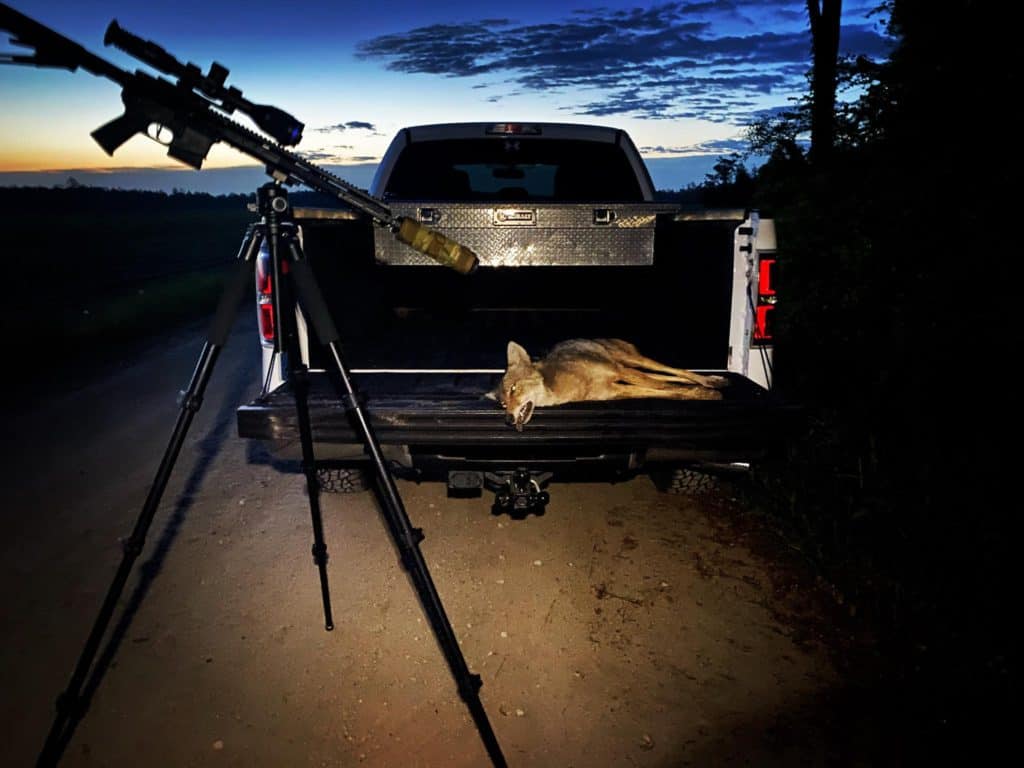
Unlawful Activities For Take, Possession Or Sale Of Nongame Wildlife.
It is unlawful to:
- Take any nongame species for commercial purposes (sale, offer for sale, barter, or exchange) from public lands or waters.
- Possess armadillos for the purpose of sale.
- Purchase, sell, trade, transport or ship out of state bobcat pelts without the appropriate pelt tag (CITES) attached. Pelt tags must be attached prior to being transported or shipped out of this state. Pelt tags may be obtained from any permitted bobcat pelt dealer, or any TPWD Regional and Field Law Enforcement Office. For additional information contact TPWD at (800) 792-1112, menu 7, option 9 or (512) 389-4481.
- Transport or sell live coyotes, as they are currently under a statewide rabies quarantine. For additional information, visit the DSHS website.
- Possess a diamondback terrapin at any time.
- Hunt (capture, trap, take or kill) any wild animal or wild bird on a public road or the right-of-way of public roads, except that a person may capture indigenous reptiles and amphibians (for recreational purposes only) on the shoulder or unpaved right-of-way of a public roadway, provided the person possesses a valid Reptile and Amphibian Endorsement, the person employs non-lethal means only to capture the reptiles or amphibians, the person does not possess a trap, and the person is visibly wearing at least 144 square inches of reflective material, both front and back. No person may use artificial light from a motor vehicle to locate, capture, or attempt to capture a reptile or amphibian.
- Collect from the wild, sell, offer for sale or exchange certain species of nongame wildlife; however, many species of nongame may be sold, offered for sale, bartered, or exchanged, provided the proper nongame permit has been obtained from TPWD and all reporting and recordkeeping requirements are met.
- Take or possess any freshwater turtles taken from the wild for commercial purposes.
- Possess more than 6 individuals of any species of freshwater turtle from the wild.
For more information on nongame regulations, permit requirements, and lists of lawful and prohibited species, contact TPWD at (800) 792-1112, menu 7 or (512) 389-4481, or visit Nongame Permits.
Lawful Means and Methods
It is legal to:
- Hunt animals and non-migratory game birds from a motor vehicle, powerboat, sailboat, or from any other floating device within the boundaries of private property or upon private water.
- Use calling devices (including manual and mouth-operated), recordings, and electrically amplified calls to hunt game animals and game birds. Electronic calls may not be used to hunt migratory game birds except during the Light Goose Conservation Order season.
- Use decoys to hunt game animals and game birds. No person may use live decoys when hunting migratory game birds.
- Bait for game animals, nongame animals, and upland game birds, except for Eastern turkey and migratory game birds. (Baiting is unlawful on most public property. Please check specific regulations for that public property.)
- Trap nongame/exotic animals (such as feral hogs, rabbits, etc.) on private property.
- Use dogs to aid in the hunting of any game bird.
Where is the best place to shoot a coyote? Find out here.
Can you use an electronic caller when hunting coyotes in Texas?
Yes, you may use calling devices (including manual and mouth-operated), recordings, and electrically amplified calls to hunt coyotes in Texas on private property.
What are the legal firearms that can be used to hunt in Texas?
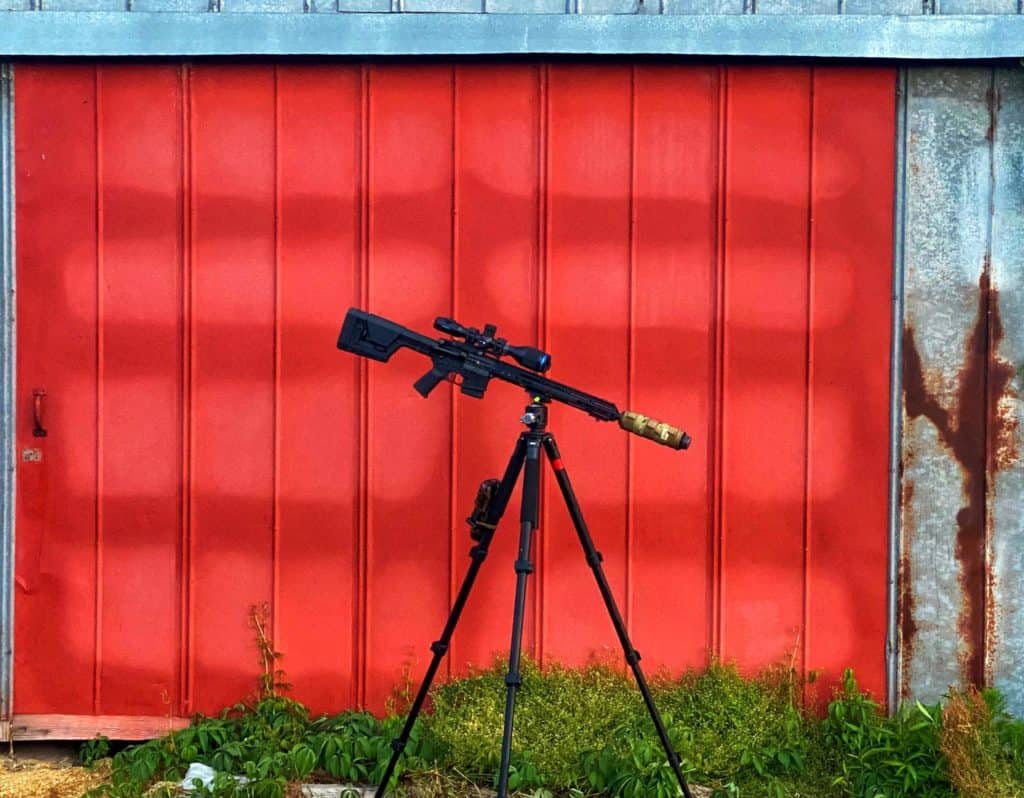
Game animals and non-migratory game birds may be hunted with any legal firearm, except:
- Rimfire Ammunition (of any caliber) may NOT be used to hunt white-tailed deer, mule deer, desert bighorn sheep, or pronghorn.
- Shotguns are the only legal firearm that may be used during spring Eastern turkey season.
- Magazine Capacity (number of shells/cartridges allowed): there are no restrictions on the number of shells or cartridges a legal firearm may hold when hunting game animals or game birds (except migratory game birds, see Legal Shotgun).
- Muzzleloaders: muzzleloader deer seasons are restricted to muzzleloading firearms only: any firearm designed such that a bullet/ projectile, and powder can be loaded only through the muzzle (as opposed to breech-loading firearms). A cap and ball firearm in which the powder and ball are loaded into a cylinder is not a muzzleloader.
- Suppressors (aka “silencers” ): may be used to take any wildlife resource; however, all federal, state and local laws continue to apply.
Archery and Crossbows
- Only lawful archery equipment prescribed in this section may be used for taking game animals or game birds.
- Lawful archery equipment includes compound bows, crossbows, longbows, and recurved bows.
- Lawful archery equipment may not be used to hunt deer during the Muzzleloader-Only Deer Season.
- Lawful archery equipment is lawful for non-protected non- game animals.
Longbows, Compound Bows, Recurved Bows
- There is no minimum draw requirement.
- Lighted pins, sight magnification, overdraw rests, and devices that allow a bow to be locked at full or partial draw are lawful during any season when lawful archery equipment may be used.
Crossbow
- In Collin, Dallas, Grayson, and Rockwall counties, no person may use a crossbow to hunt deer during the Archery-Only Open Season unless the person has an upper-limb disability and has in immediate possession a physician’s statement that certifies the extent of the disability. An upper-limb disability and has in immediate possession a physician’s statement that certifies the extent of the disability. An upper-limb disability is a permanent loss of the use of fingers, hand, or arm in a manner that renders the person incapable of using a longbow, compound bow, or recurved bow.
- An Archery Endorsement is required to hunt deer during the Archery-Only Open Season. An archery endorsement is required to hunt deer, turkey and/or javelina at any time in Collin, Dallas, Grayson, and Rockwall counties, including during the general open season (Nov. 7 – Jan. 3).
- Any person, regardless of physical ability, may use a crossbow to hunt game animals or game birds in any county, including Collin, Dallas, Grayson, and Rockwall counties, during a general open season or Eastern spring turkey season.
Projectiles (Arrows and Crossbow Bolts)
- While hunting game animals and game birds, a projectile may not be poisoned, drugged, or explosive.
- When used to hunt turkey and all game animals other than squirrels, a projectile must be equipped with a broadhead hunting point. An archer may have arrows/bolts with field, target, or judo points in the quiver with the broadhead hunting points.
- There are no restrictions or minimum requirements on arrow or bolt lengths, arrow material, arrow weight, lighted nocks, broadhead lengths or diameter, number of cutting edges, broadhead material, or mechanical broadheads.
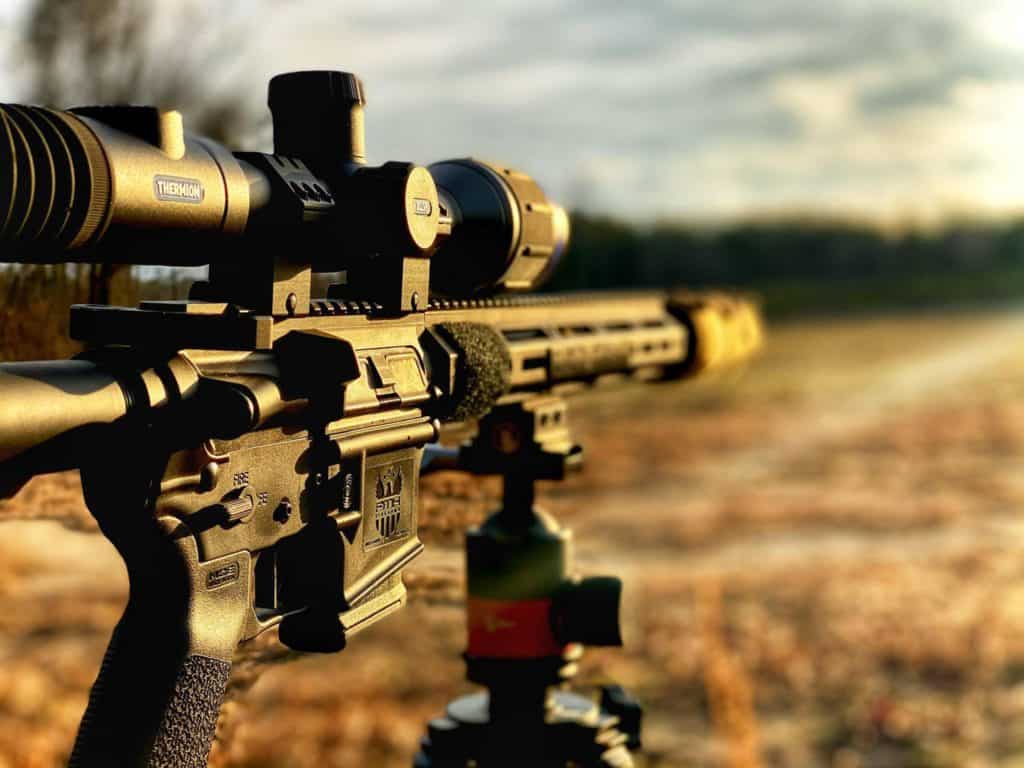
Unlawful activities when hunting coyotes in Texas.
It is unlawful to:
- Knowingly discharge a firearm causing a projectile to cross a property line, unless the person owns both sides of the property line or has obtained written permission from the owner of any land crossed by the projectile.
- Discharge a firearm on or across a public road or hunt from public roads.
- Use a computer, or operate a facility that uses a computer, to assist in remote firearm or archery hunting, if the animal being hunted is located in Texas.
- Hunt with the aid of artificial light of any form that casts or reflects a beam of light onto or otherwise illuminates a game animal or bird; exception: hunters with legal blindness, or hunters who have a documented permanent physical disability that prevents them from using traditional firearm sighting devices may use laser sighting devices.
- Hunters with blindness must possess a physician’s signed statement attesting to legal blindness; and be assisted by a licensed hunter at least 13 years of age who is not legally blind. Legal blindness is defined in section 62.104 (c) of the Texas Government Code.
- Hunter education and licensing requirements still apply to hunters with legal blindness, hunters with a documented permanent physical disability, and persons assisting hunters with blindness or other disability.
- All hunters may use battery-powered scoping devices that project a light or dot only inside the scope or pin sight lights on archery equipment.
- Use traps to hunt game birds or game animals.
- Use dogs to hunt deer in this state.
- No person may possess a shotgun and buckshot or slugs while in the field with dogs on another person’s land during an open deer season in Angelina, Hardin, Jasper, Nacogdoches, Newton, Orange, Sabine, San Augustine, Shelby, and Tyler counties.
- No more than two dogs may be used to trail a wounded deer in all counties; however, in Jasper, Newton, Sabine, and San Augustine counties, a person may trail a wounded deer with no more than two leashed dogs held by the person in control of the dogs. A “wounded deer” is a deer leaving a blood trail.
- Use aircraft (including drones, except by activity-specific permit) to hunt, locate (including wounded animals), manage, harass, drive, trap or photograph any wild animal.
- Hunt on Public Hunting Areas without the required permits.
- Hunt in a subdivision on lots 10 acres or less in an unincorporated area of a county if prohibited by local ordinance. Contact local county clerk and ask about §235.022, Local Government Code.
- Hunt anywhere by means or methods that have been prohibited by county or city ordinance.
- Hunt on any area named as a wildlife sanctuary, nesting, or propagation area.
- Hunt in state and/or national parks or refuges except during scheduled hunts or under other special state or federal policies.
- Hunt any wild animal or wild bird on or over privately-owned land that is submerged under public freshwater due to seasonal or occasional inundation or submerged under saltwater above the mean high tide line. The property must be posted to indicate that hunting is prohibited.
- Hunt any wild animal or wild bird, including exotic animals, on foot or from a vehicle on any public road or road right- of-way, or a boat on public water, except that migratory waterfowl may be hunted from a boat or any floating craft (except a sinkbox) under certain conditions.
- Possess a firearm if a convicted felon, with limited exception. Texas law allows the possession and use of a muzzle loading firearm if it is an antique or curio firearm manufactured before 1899, or is a replica of an antique or curio firearm manufactured before 1899 that does not use rimfire or centerfire ammunition. For questions regarding the possession and use of firearms by convicted felons, refer to Texas Penal Code Ch. 46 and/or seek guidance from legal counsel.
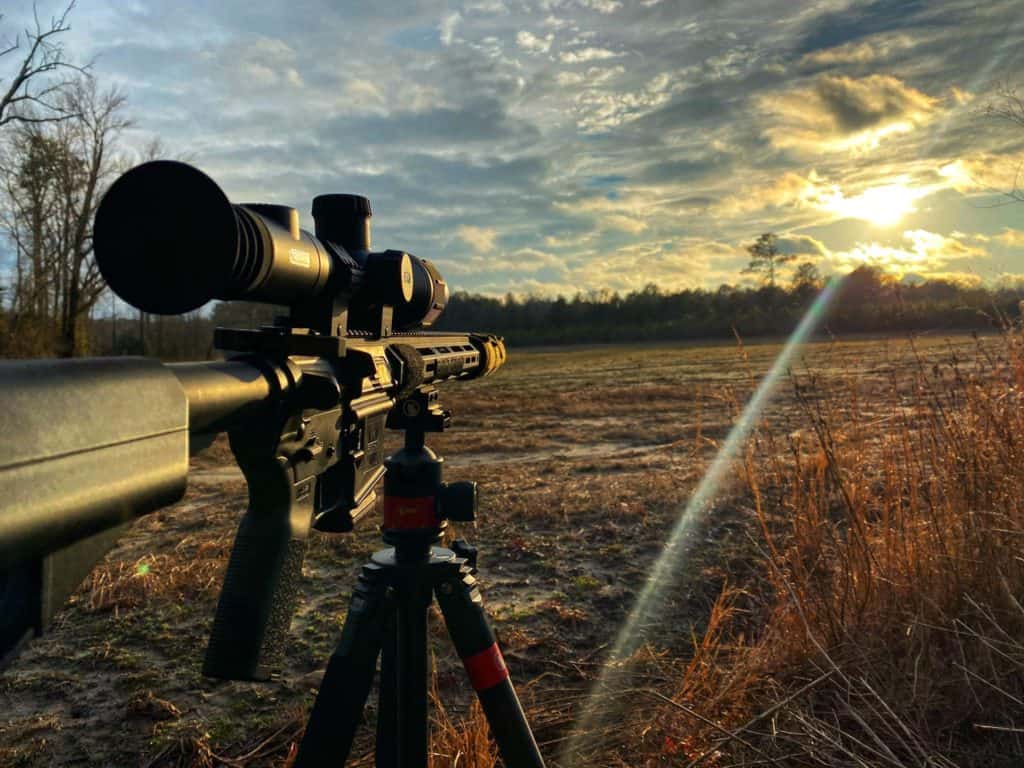
Using public land in Texas when coyote hunting?
There are a great deal more laws covering the use of public lands in Texas. Make sure you read and understand thee regulations and check for updates before accessing public land.
Prohibited Acts.
Important — in addition to the other applicable statutes or regulations, a person on Public Hunting Lands commits an offense if that person:
General Access to the Units:
- fails to possess a valid permit, hunting license, and appropriate endorsement;
- possesses a firearm, archery equipment, crossbow, trap, snare, or other device for taking wildlife resources on public hunting lands and does not have the permit required to take wildlife resources on the concerned unit;
- enters an area identified by boundary signs as a limited use or restricted zone and fails to obey the restrictions on public use posted at the unit or contained within this Map Booklet;
- enters an area identified by boundary signs or on the unit map as a restricted zone;
- fails to perform paper or electronic on-site registration or report to a departmental check station as required for certain units and species;
- trespasses on or shoots into adjacent privately-owned property without the landowner’s permission;
- enters the hunting area when access is restricted.
Alcohol:
- is under the influence of alcohol or consumes an alcoholic beverage while engaged in hunting activities, or publicly consumes or displays an alcoholic beverage.
Hunter Orange:
- fails to visibly wear at least 400 square inches of hunter orange material with orange headwear and at least 144 square inches appearing on both chest and back during daylight hours at times when hunting with firearms is permitted. Exempt from these requirements are: (1) authorized department personnel and landowner employees, (2) persons hunting turkey or migratory game birds, (3) persons within the enclosed passenger compartment of a motor vehicle, (4) persons within a designated campground, designated vehicle parking area, designated boat launching facility or departmental check station, and (5) persons other than hunters on COE properties.
Notice to archery hunters and recreational users: you must wear hunter orange during daylight hours at any time when firearm hunting for any species is authorized on the unit. Many units allow firearm hunting year-round for rabbits, and firearm hunts for squirrel and dove often are conducted concurrently with archery deer hunts.
Hunting
- takes any species, sex, or type of wildlife resource not designated as legal game as shown in the Legal Game Legend section;
- takes or attempts to take a game animal or game bird other than during legal shooting hours of the open seasons and by the means and methods established by the Statewide Hunting and Fishing Proclamation and the Migratory Game Bird Proclamation, or as otherwise provided for a specific unit in these webpages;
- takes or attempts to take a furbearing animal or predatory animal other than during the open seasons and by the means and methods established by the Statewide Furbearing Animal and Trapping Proclamation or as otherwise provided for a specific unit in this Map Booklet;
- takes or attempts to take a feral hog, rabbit or hare other than during daylight hours of the open seasons and by the means and methods provided for a specific unit in this Map Booklet;
- takes an antlerless deer during the general open season on wildlife management areas jointly managed by TPWD and the U.S. Forest Service (902, 903, 904, and 905) unless that person possesses on their person a USFS antlerless permit, if they are required.
Baiting and Trapping
- baits wildlife (see Definitions) on public hunting lands, except when performed in conjunction with the use of traps or snares for taking furbearers and predatory animals, or as otherwise authorized by the department for a specific unit, activity and time period;
- hunts over a baited area except as authorized by the department for a specific unit, activity and time period;
- uses a trap or snare to take feral hogs or any wildlife resource unless under contract with the department or cooperating landowner;
- uses a trap or snare to take furbearers or predatory animals, except as authorized on specific units during the period from November 1 through March 31;
- fails to visibly and legibly mark each trap or snare with the document number of the trapper’s current Annual Public Hunting Permit;
- sets a trap or snare within 50 yards of a designated road or public hunting lands boundary or within 400 yards of a designated campsite;
- uses deadfalls or lethal chemicals for taking wildlife resources;
- uses recorded or electric calling devices to take wildlife resources other than furbearers and predatory animals or except as provided for any Special Migratory Conservation season;
Notice: the use of scent lures simulating animal odors is not considered baiting.
Means and Methods
- possesses a loaded firearm within or on a motor vehicle except as provided for a disabled person;
- possesses a loaded firearm within a designated campsite, designated vehicle parking area, designated boat launching facility or departmental check station;
- discharges a firearm, bow and arrow, or crossbow from, onto, along, or across a designated road or designated campsite;
- uses or displays a firearm or archery equipment in an obviously unsafe or threatening manner;
- possesses buckshot on public hunting lands, except as authorized by the department for a specific unit, activity and time period;
- uses or possesses shotshells or loose shot other than non-toxic shot while hunting waterfowl;
- uses a firearm that utilizes rimfire ammunition in taking deer;
- uses a rifle, handgun, or a shotgun with slugs to take a game bird;
- uses a firearm to take deer during the archery only deer season;
Vehicles, Airboats, and Horses:
- enters a unit of public hunting lands with an equine (horse, mule or burro) unless that person has in their immediate possession a completed VS Form 10-11 (Texas Animal Health Commission) showing that the equine has a negative Coggins test within the previous 12 months. The documentation required by this paragraph shall be made available for inspection upon the request of any department employee acting within the scope of official duties.
- uses or possesses a horse, mule, burro or any type of riding stock or pack animal on public hunting lands at any time, except on units 901, 902, 903, 904, and 905; or as provided in this Map Booklet for a specific unit or in accordance with group equestrian events which are scheduled and authorized by the department;
- uses or possesses a horse, mule, burro or any type of riding stock or pack animal on U.S. Army Corps of Engineers lands that allows equestrian use and does not possess either the APH or LPU Permit;
- does not confine motor vehicle use to designated roads, except parking is permitted on the shoulder of or immediately adjacent to designated roads, and as provided for a person with disabilities or for a person directly assisting them on designated roads or trails (see USFS restrictions); Note: persons directly assisting a person with disabilities must remain within normal voice distance.
- hunts from a motor vehicle, except as provided for a person with disabilities;
- parks or leaves a motor vehicle unattended anywhere other than in designated parking areas or designated road;
- operates an all terrain vehicle (ATV), off-highway vehicle (OHV) or off-road vehicle (ORV) on public hunting lands and is not (1) a person with disabilities or directly assisting a person with disabilities, on a designated ATV, OHV, or ORV road or trail, (2) otherwise authorized by the department to do so, and (3) compliant with the safety requirements for ATV use as set by the Texas Department of Public Safety (ATV only); (see USFS restrictions);
- operates an Off-Highway Vehicle (OHV) on public lands without the required OHV decal; decal requirements are waived for persons with disabilities;
- uses an airboat within the boundaries of public hunting lands, except as provided by executive order or by written permission of the department;
Dogs:
- uses a dog to hunt deer or turkey;
- uses a dog to hunt feral hogs and other exotic mammals unless specifically allowed for in the Legal Game Legend on the unit maps;
- uses a dog to hunt furbearers or predatory animals during daylight hours within an open general season for deer on public hunting lands;
- fails to keep all dogs in designated campsites confined or leashed;
Hunting Blinds, Gear and Equipment:
- constructs or places a hunting blind, stand, tower, or platform within 50 yards of any designated road, marked unit boundary, or designated campsite;
- constructs a permanent blind, stand, tower, or platform
- leaves a hunting blind, stand, tower, or platform in place for more than 72 hours or uses metal nails, spikes, screws, or bolts to attach such structures to the timber;
- leaves personal gear, equipment (including decoys), or floating conveyances unattended for more than one hour following the close of legal shooting hours.
- Note: this does not apply to gear or equipment left within a designated camping area or for specific activities scheduled by the department.
Camping:
- camps or builds a fire anywhere other than in a designated campsite, except on units 901, 902, 903, 904, and 905 where this restriction applies only from the day prior to the opening of the archery deer season through the day following the close of the general deer season;
- causes, creates, or contributes to excessive or disturbing sounds beyond the person’s immediate campsite between the hours of 10 p.m. and 6 a.m.;
- establishes a camp and leaves it unattended for a period of longer than 24 hours;
- establishes a camp for more than 14 consecutive days on the same unit of public hunting lands, or for more than 21 days in a 30-day period;
General Conduct:
- fails to deposit refuse in designated containers or remove it from the unit;
- writes on, scratches, or otherwise defaces natural features, signs, buildings, or other structures;
- disturbs or removes plants, wood, rocks, gravel, sand, soil, shell, artifacts, or other objects from public hunting lands without proper authorization;
- fails to obey regulations posted at the unit or listed in this Map Booklet;
- fails to comply with instructions on permits or area/unit leaflets; or refuses to follow directives given by departmental personnel in the discharge of official duties.
- engage in any activity not specifically authorized by order of the executive director or regulation of the commission;
- leaves feathers or bird parts within designated parking areas or near livestock watering facilities.
If you aim to hunt coyotes in Texas, make sure you read and understand all current hunting regulations. It is your responsibility to know and obey the law.
